
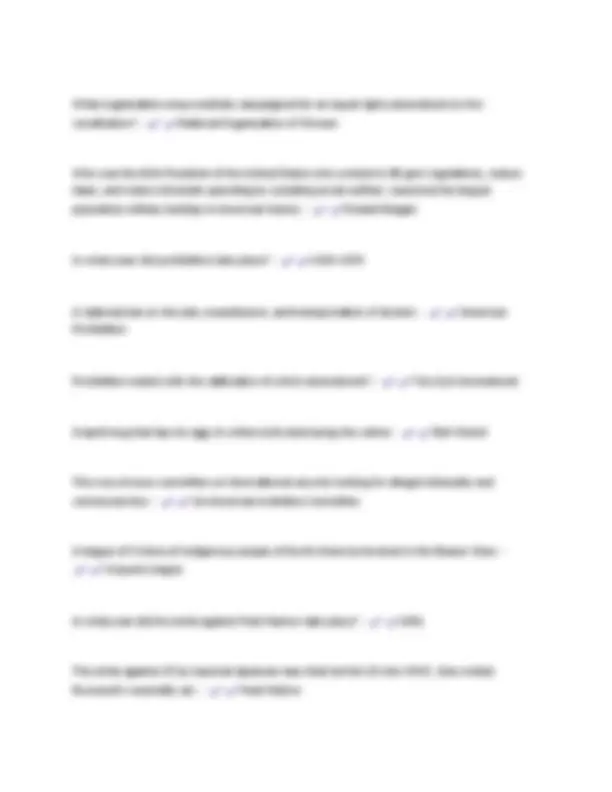
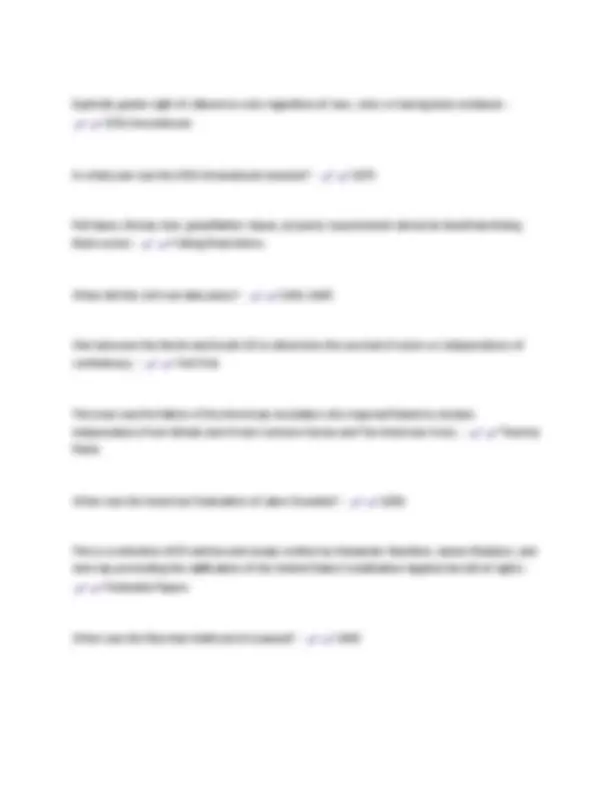
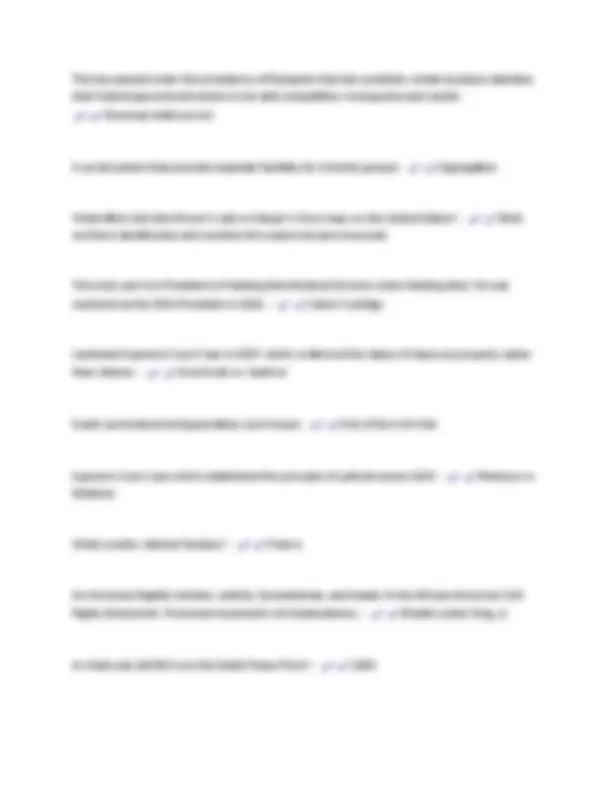
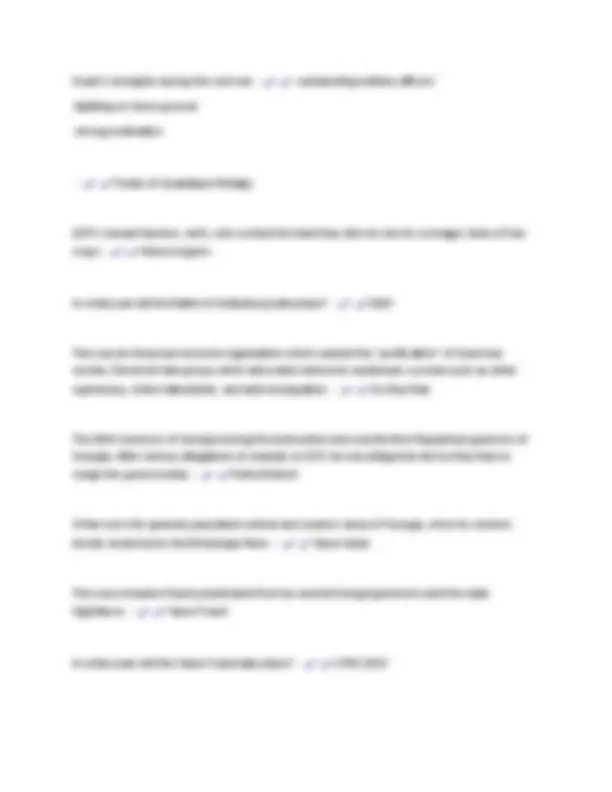
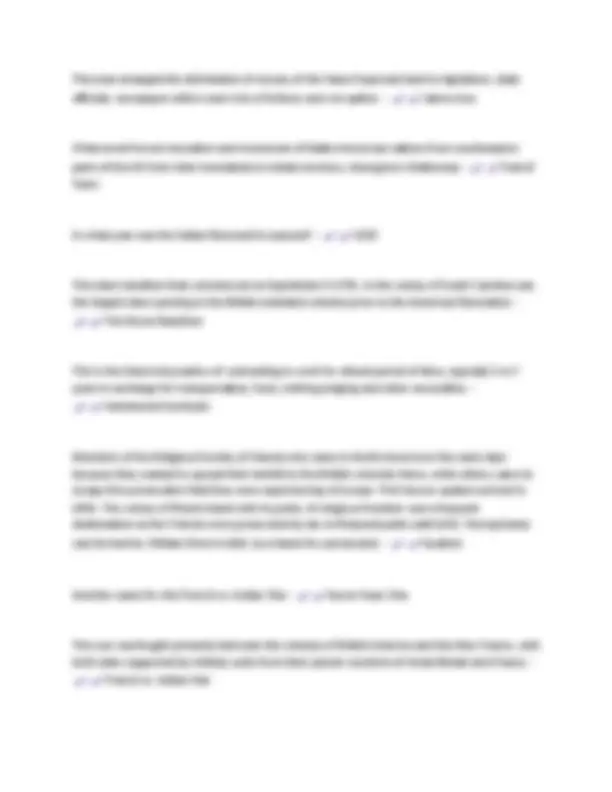
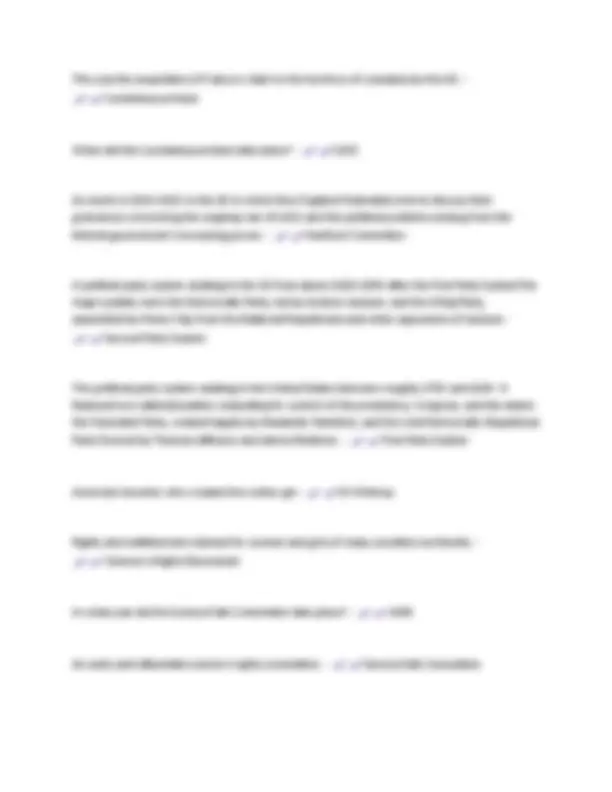
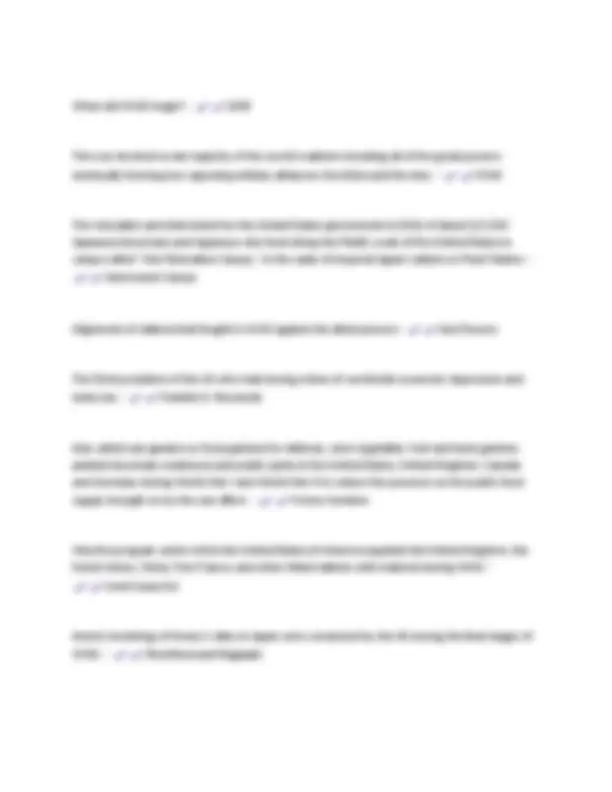
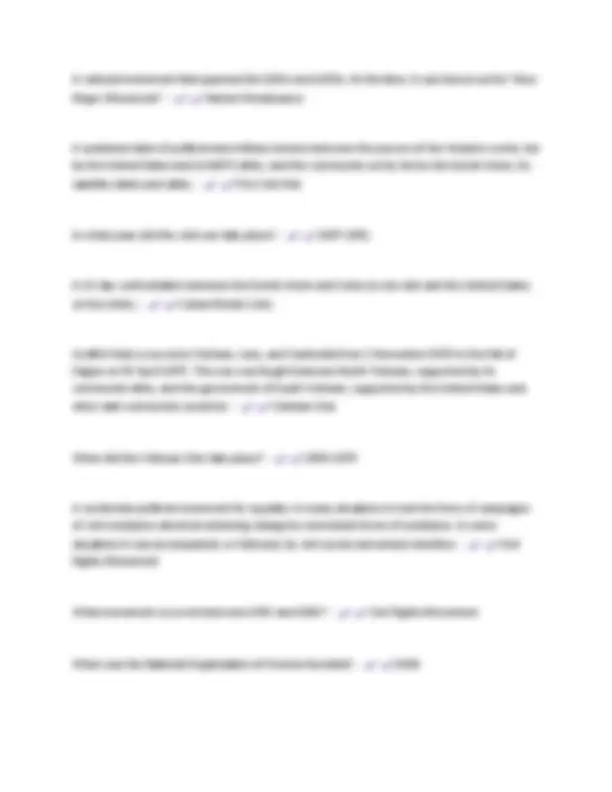
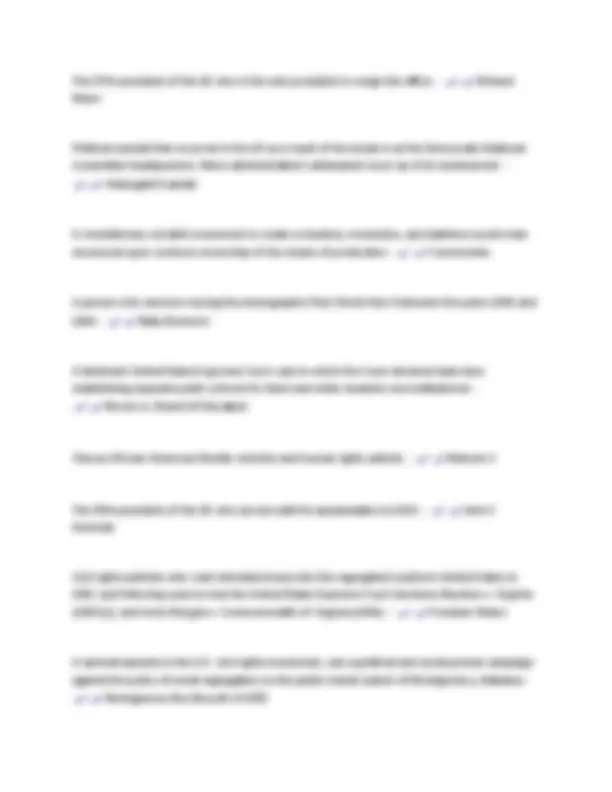
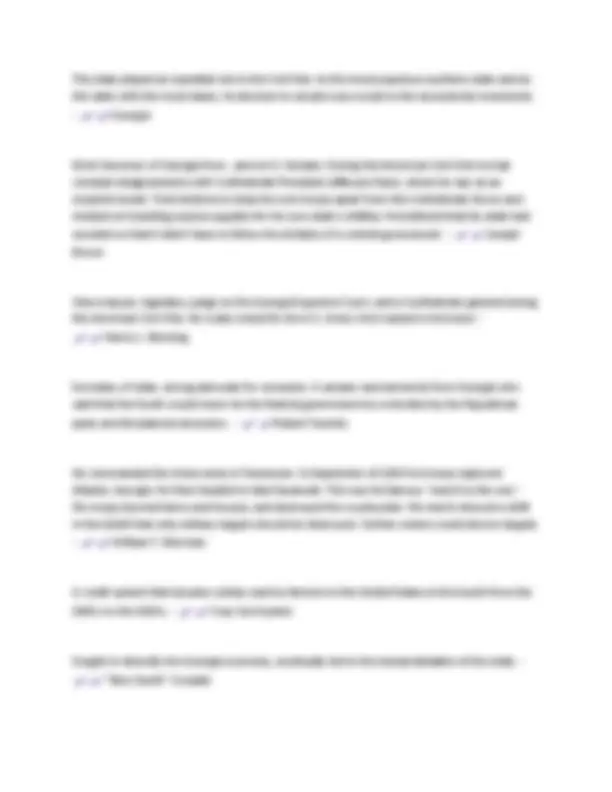
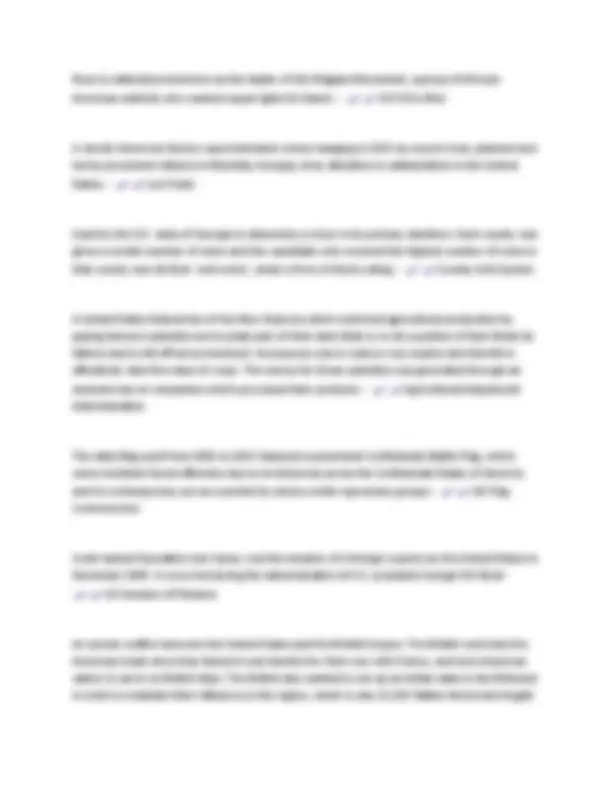
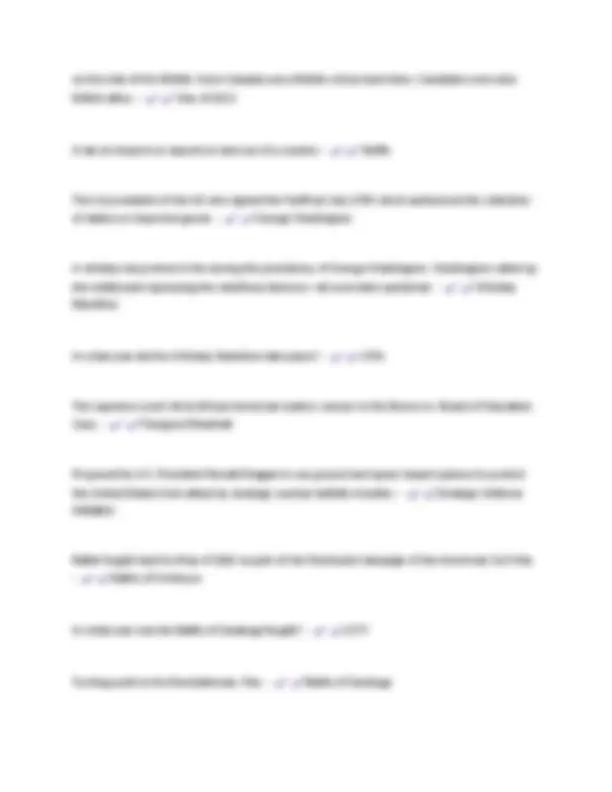
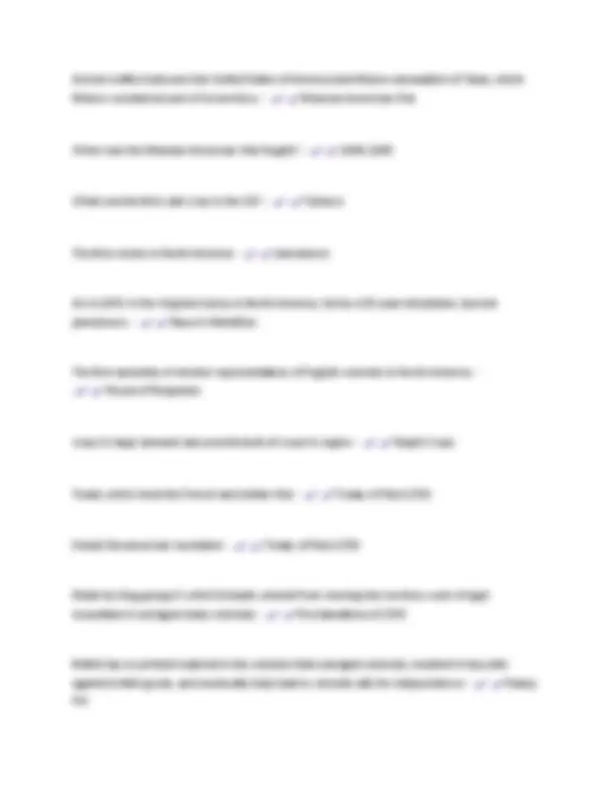
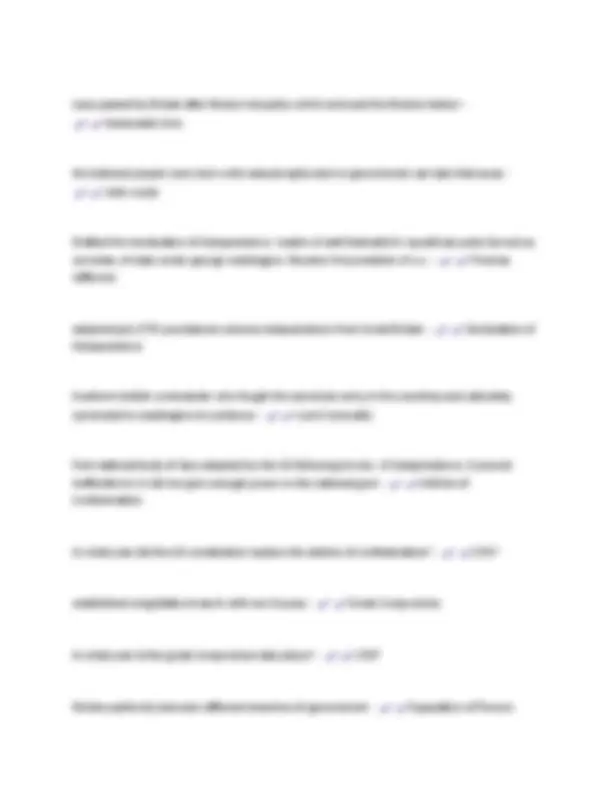
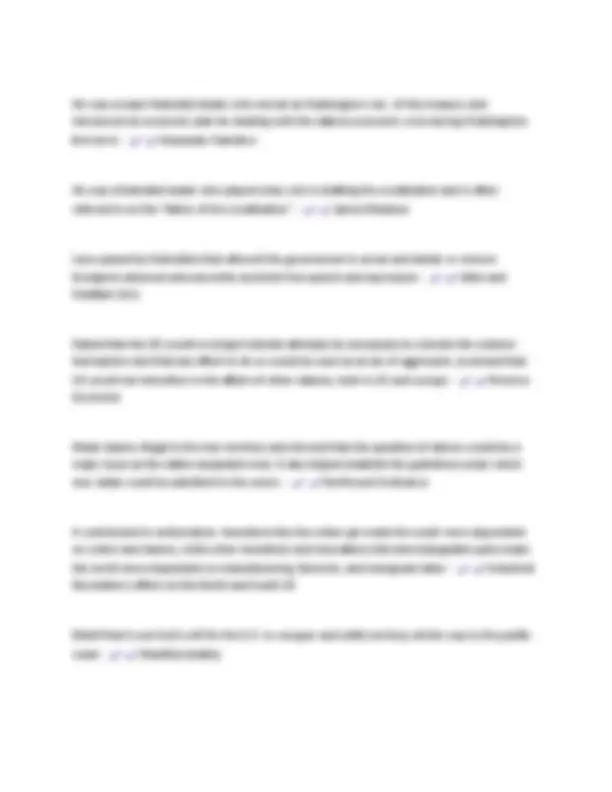
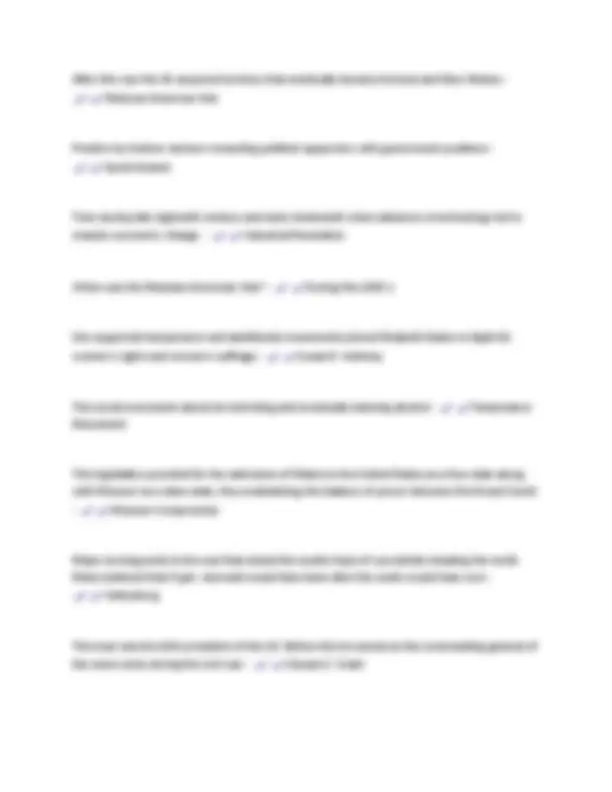
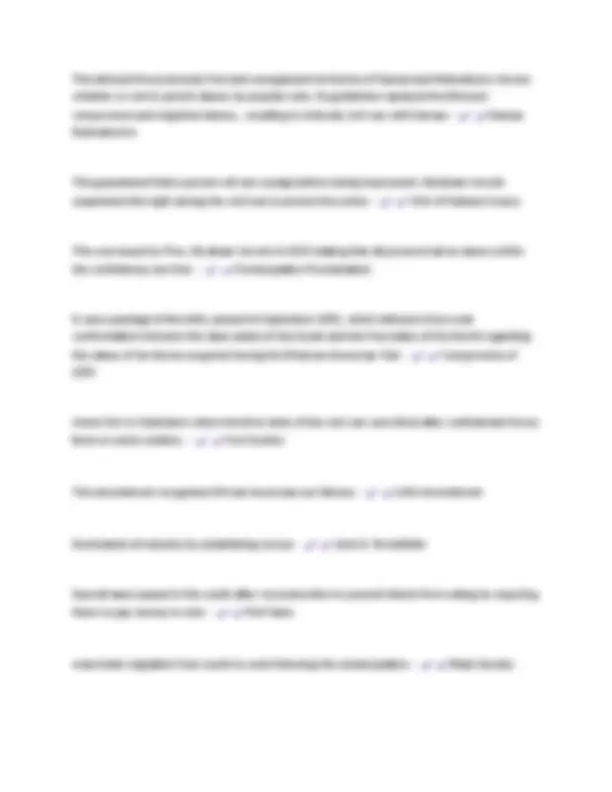
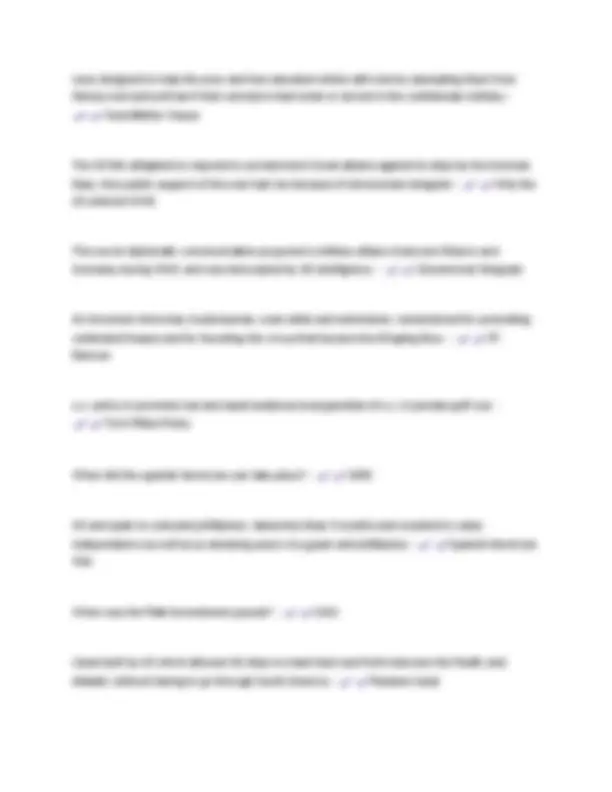
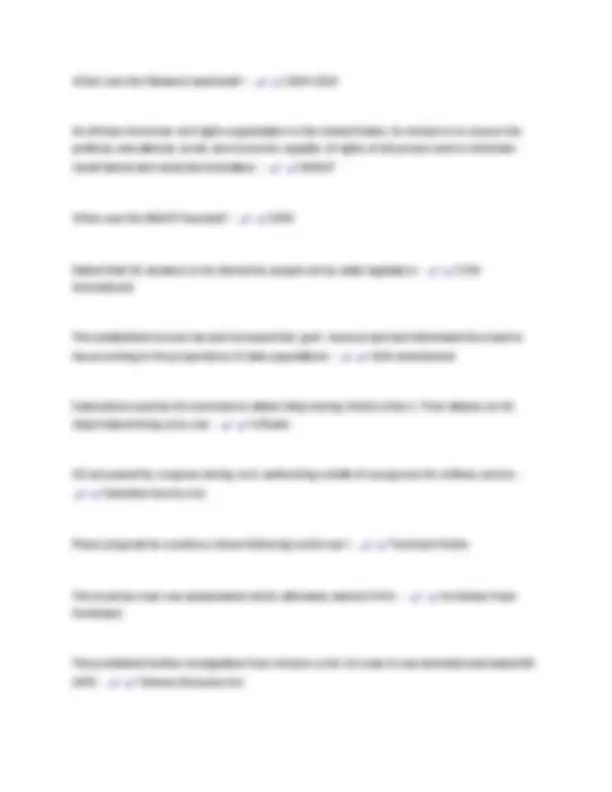
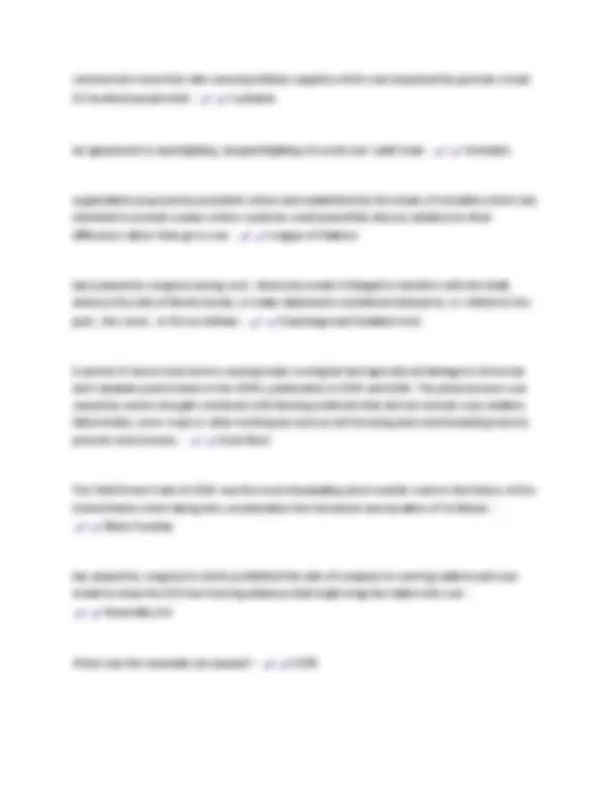
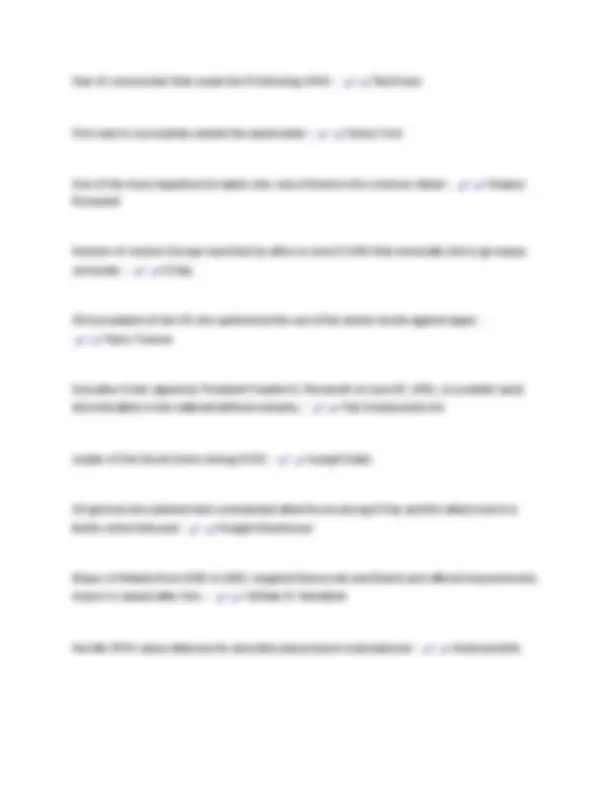
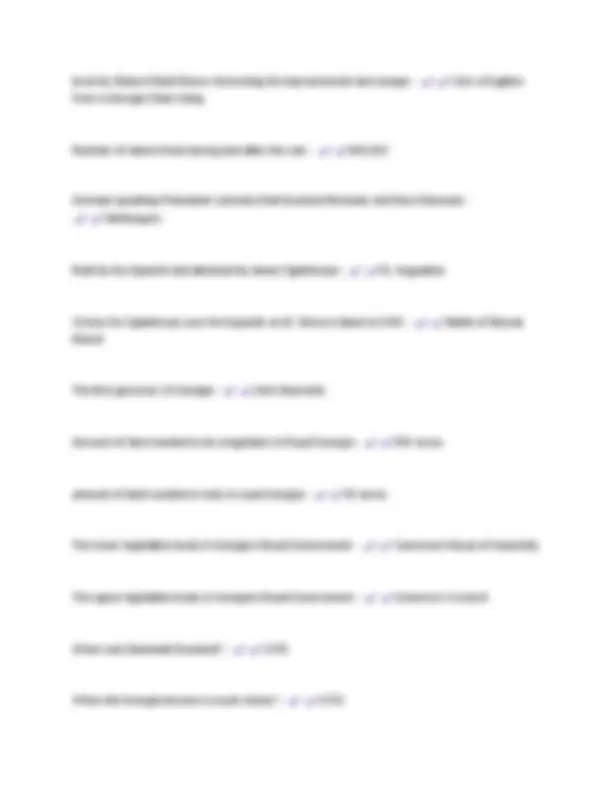
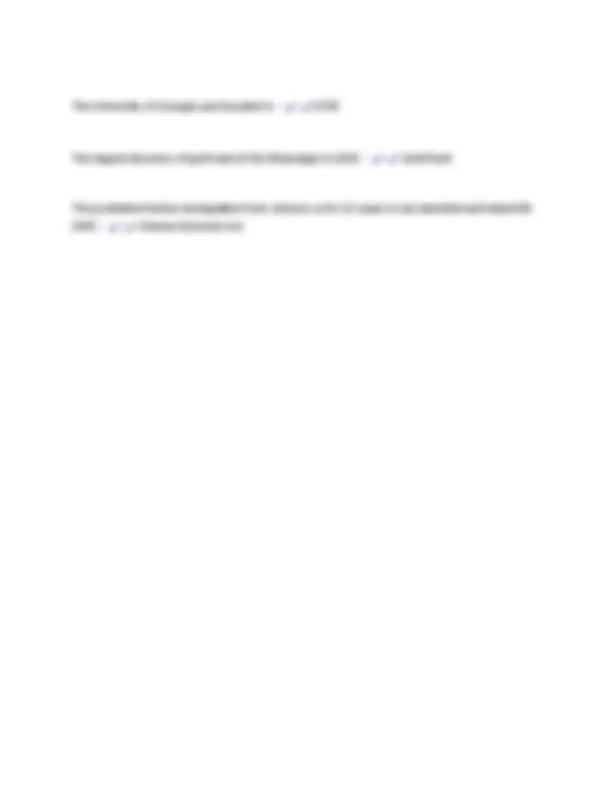


Study with the several resources on Docsity

Earn points by helping other students or get them with a premium plan


Prepare for your exams
Study with the several resources on Docsity

Earn points to download
Earn points by helping other students or get them with a premium plan
Community
Ask the community for help and clear up your study doubts
Discover the best universities in your country according to Docsity users
Free resources
Download our free guides on studying techniques, anxiety management strategies, and thesis advice from Docsity tutors
He was a spanish explorer who marched across Mexico and conquered the Aztecs - Hernan Cortes He explored deep in USA, first to discover and cross the Mississippi River and claim it for Spain - Hernando de Soto This man was a member of the English Parliament who founded the colony of Georgia. - James Edward Oglethorpe Who was Georgia's 3rd and final royal governor who fled the colony after the start of the American Revolution? - James Wright In what year did the 13th amendment abolish slavery and involuntary servitude? - 1864 Who settled land in New York along the Hudson River? - The Dutch This man was an African American educator born into slavery who called for black progress through education. - Booker T Washington Act of Congress that created and established the Federal Reserve System, the central banking system of the United States, and granted it the legal authority to issue Federal Reserve Notes,
Typology: Exams
1 / 31

This page cannot be seen from the preview
Don't miss anything!
























He was a spanish explorer who marched across Mexico and conquered the Aztecs - Hernan Cortes He explored deep in USA, first to discover and cross the Mississippi River and claim it for Spain - Hernando de Soto This man was a member of the English Parliament who founded the colony of Georgia. - James Edward Oglethorpe Who was Georgia's 3rd and final royal governor who fled the colony after the start of the American Revolution? - James Wright In what year did the 13th amendment abolish slavery and involuntary servitude? - 1864 Who settled land in New York along the Hudson River? - The Dutch This man was an African American educator born into slavery who called for black progress through education. - Booker T Washington Act of Congress that created and established the Federal Reserve System, the central banking system of the United States, and granted it the legal authority to issue Federal Reserve Notes, and Federal Reserve Bank Notes as legal tender. - Federal Reserve Act In what year was the Federal Reserve Act ratified? - 1913
What machine automated cotton processing and INCREASED the need for slaves? - Cotton Gin This man was a quaker who founded Pennsylvania. He wanted to unite all of the UA colonies and pushed for democracy and religious freedom. - William Penn What was Georgia's fourth capital and seat of the state government during the Civil War (1861 - 1865)? - Milledgeville In 1832 SC argued that the federal tariffs were unconstitutional and President Jackson sent Troops to force SC to pay tariffs. - Nullification Crisis In 1925 a substitute teacher was accused of violating Tennessee's Butler Act - Scopes Trial The period after the Civil War in the United States when the southern states were reorganized and reintegrated into the Union - Reconstruction Era In what years did the Reconstruction Era occur? - 1865 - 1877 A series of economic programs enacted in the United States between 1933 and 1936. They involved presidential executive orders or laws passed by Congress during the first term of President Franklin D. Roosevelt. - The New Deal Between what years was The New Deal enacted? - 1933 - 1936 An African American social reformer, orator, writer and statesman. Former Slave who was the leader of the abolitionist movement and supported women's suffrage. - Frederick Douglass
Explicitly grants right of citizens to vote regardless of race, color or having been enslaved. - 15th Amendment In what year was the 15th Amendment enacted? - 1870 Poll taxes, literacy test, grandfather clause, property requirements aimed at disenfranchising black voters - Voting Restrictions When did the civil war take place? - 1861 - 1865 War between the North and South US to determine the survival of union or independence of confederacy. - Civil War This man was the father of the American revolution who inspired Rebels to declare independence from Britain and Wrote Common Sense and The American Crisis. - Thomas Paine When was the American Federation of Labor founded? - 1886 This is a collection of 85 articles and essays written by Alexander Hamilton, James Madison, and John Jay promoting the ratification of the United States Constitution-Against the bill of rights - Federalist Papers When was the Sherman Antitrust Act passed? - 1890
This law passed under the presidency of Benjamin Harrison prohibits certain business activities that Federal government deems to be anti-competitive.-monopolies and cartels - Sherman Antitrust Act A social system that provides separate facilities for minority groups - Segregation What effect did John Brown's raid on Harper's Ferry have on the United States? - Both northern abolitionists and southern fire-eaters became incensed. This man was Vice President of Harding then finished his term when Harding died. He was reelected as the 30th President in 1924. - Calvin Coolidge Landmark Supreme Court Case in 1857 which confirmed the status of slaves as property rather than citizens. - Dred Scott vs. Sanford South surrendered at Appomattox court house - End of the Civil War Supreme Court case which established the principle of judicial review 1803 - Marbury vs. Madison What country claimed Quebec? - France An American Baptist minister, activist, humanitarian, and leader in the African-American Civil Rights Movement. Promoted nonviolent civil disobedience. - Martin Luther King, Jr. In what year did MLK win the Nobel Peace Prize? - 1964
What 3 dangers did Washington stress in his farewell address? - 1) political parties could divide the nation
South's strengths during the civil war - - outstanding military officers
This was the acquisition of France's claim to the territory of Louisiana by the US. - Louisiana purchase When did the Louisiana purchase take place? - 1803 An event in 1814-1815 in the US in which New England Federalists met to discuss their grievances concerning the ongoing war of 1812 and the political problems arising from the federal government's increasing power. - Hartford Convention A political party system existing in the US from about 1828-1854 after the First Party SystemThe major parties were the Democratic Party, led by Andrew Jackson, and the Whig Party, assembled by Henry Clay from the National Republicans and other opponents of Jackson. - Second Party System The political party system existing in the United States between roughly 1792 and 1824. It featured two national parties competing for control of the presidency, Congress, and the states: the Federalist Party, created largely by Alexander Hamilton, and the rival Democratic-Republican Party formed by Thomas Jefferson and James Madison. - First Party System American Inventor who created the cotton gin - Eli Whitney Rights and entitlements claimed for women and girls of many societies worldwide. - Women's Rights Movement In what year did the Seneca Falls Convention take place? - 1848 An early and influential women's rights convention. - Seneca Falls Convention
Movement to end slavery, whether formal or informal. In western Europe and the Americas, movement to end the African slave trade and set slaves free. - Abolition Movement When was the Morrill Act passed? - 1862 Act which states that land-Grants are United States statutes that allowed for the creation of land-grant colleges, - Morrill Act An American statesman and leader of the Confederacy during the American Civil War, serving as President of the Confederate States of America for its entire history. - Jefferson Davis The 17th president of the US. He presided over the initial Reconstruction era of the United States following the Civil War. His reconstruction policies failed to promote the rights of the Freedmen (newly freed slaves), and he came under vigorous political attack from Republicans, ending in his impeachment by the U.S. House of Representatives; he was acquitted by the U.S. Senate. - Andrew Johnson Raid on Harpers Ferry was an attempt by this white abolitionist to start an armed slave revolt by seizing a United States Arsenal at Harpers Ferry in Virginia in 1859. Brown's raid was defeated by a detachment of U.S. military - John Brown's Raid The compulsory enlistment of people in some sort of national service, most often military service. - Conscription U.S. political party that sought to represent the interests of farmers and laborers in the 1890s, advocating increased currency issue, free coinage of gold and silver, public ownership of railroads, and a graduated federal income tax - Populist Party When did WW1 begin? - July 28, 1914
When did WW2 begin? - 1939 This war involved a vast majority of the world's nations-including all of the great powers- eventually forming two opposing military alliances: the Allies and the Axis. - WW The relocation and internment by the United States government in 1942 of about 110, Japanese Americans and Japanese who lived along the Pacific coast of the United States to camps called "War Relocation Camps," in the wake of Imperial Japan's attack on Pearl Harbor. - Internment Camps Alignment of nations that fought in WW2 against the allied powers - Axis Powers The 32nd president of the US who lead during a time of worldwide economic depression and total war. - Franklin D. Roosevelt Also called war gardens or food gardens for defense, were vegetable, fruit and herb gardens planted at private residences and public parks in the United States, United Kingdom, Canada and Germany during World War I and World War II to reduce the pressure on the public food supply brought on by the war effort. - Victory Gardens Was the program under which the United States of America supplied the United Kingdom, the Soviet Union, China, Free France, and other Allied nations with materiel during WW2 - Lend-Lease Act Atomic bombings of these 2 cities in Japan were conducted by the US during the final stages of WW2. - Hiroshima and Nagasaki
A cultural movement that spanned the 1920s and 1930s. At the time, it was known as the "New Negro Movement" - Harlem Renaissance A sustained state of political and military tension between the powers of the Western world, led by the United States and its NATO allies, and the communist world, led by the Soviet Union, its satellite states and allies. - The Cold War In what years did the cold war take place? - 1947 - 1991 A 13-day confrontation between the Soviet Union and Cuba on one side and the United States on the other; - Cuban Missle Crisis Conflict that occurred in Vietnam, Laos, and Cambodia from 1 November 1955 to the fall of Saigon on 30 April 1975. This war was fought between North Vietnam, supported by its communist allies, and the government of South Vietnam, supported by the United States and other anti-communist countries. - Vietnam War When did the Vietnam War take place? - 1954 - 1975 A worldwide political movement for equality. In many situations it took the form of campaigns of civil resistance aimed at achieving change by nonviolent forms of resistance. In some situations it was accompanied, or followed, by civil unrest and armed rebellion. - Civil Rights Movement What movement occurred between 1950 and 1980? - Civil Rights Movement When was the National Organization of Women founded? - 1966
The 38th president of the US. Only president who was never elected President nor Vice- President by the Electoral College. - Gerald Ford The 39th president of the US and recipient of the 2002 Nobel Peace Prize. - Jimmy Carter Signed by Egyptian President Anwar El Sadat and Israeli Prime Minister Menachem following thirteen days of secret negotiations. - Camp David Accords The 41st president of the US. - George H. W. Bush Codename Desert Storm. A war waged by a UN-authorized coalition force from 34 nations led by the United States, against Iraq in response to Iraq's invasion and annexation of Kuwait. - Gulf War The 42nd president of the US. He had liberal policies- national health care plan fell under a barrage of lobbying and patisan attacks & republican victories in 94 congressional elections forced him to shift toward republican. - Bill Clinton Refers to policies that take factors including "race, color, religion, gender, sexual orientation, or national origin" into consideration in order to benefit an underrepresented group "in areas of employment, education, and business", usually justified as countering the effects of a history of discrimination. - Affirmative Action Members of Organization of Arab Petroleum Exporting Countries or the OAPEC proclaimed an oil embargo in response to the U.S. decision to re-supply the Israeli military during the Yom Kippur war. - Oil Crisis of 1973
His administration sought to make the government "competent and compassionate" but, in the midst of an economic crisis produced by rising energy prices and stagflation, met with difficulty in achieving its objectives. - Carter Administration A prominent American political organization associated with the Christian right. - Moral Majority Businessman best known for running for President of the United States in 1992 and 1996. Founded Electronic Data Systems (EDS) in 1962, sold the company to General Motors in 1984, and founded Perot Systems in 1988. Perot Systems was bought by Dell for $3.9 billion in 2009. - Henry Ross Perot A federally owned corporation in the United States created by congressional charter in May 1933 to provide navigation, flood control, electricity generation, fertilizer manufacturing, and economic development in the Tennessee Valley, a region particularly affected by the Great Depression. - Tennessee Valley Authority NAFTA - North American Free Trade Agreement is an agreement signed by the governments of Canada, Mexico, and the United States, creating a trilateral trade bloc in North America. When was NAFTA created? - 1994 Massacre was committed on December 29, 1890, on the Lakota Pine Ridge Indian Reservation in South Dakota, USA. - Battle of Wounded Knee Heroine of the American Revolutionary War whose exploits against Loyalists in the Georgia back country are the stuff of legend. Most known for holding six British soldiers at gunpoint, but this is only one of her patriotic efforts against the British. - Nancy Morgan Hart
Rose to national prominence as the leader of the Niagara Movement, a group of African- American activists who wanted equal rights for blacks. - W.E.B Du Bois A Jewish-American factory superintendent whose hanging in 1915 by a lynch mob, planned and led by prominent citizens in Marietta, Georgia, drew attention to antisemitism in the United States. - Leo Frank Used by the U.S. state of Georgia to determine a victor in its primary elections. Each county was given a certain number of votes and the candidate who received the highest number of votes in that county won all their 'unit votes', under a form of block voting. - County-Unit System A United States federal law of the New Deal era which restricted agricultural production by paying farmers subsidies not to plant part of their land (that is, to let a portion of their fields lie fallow) and to kill off excess livestock. Its purpose was to reduce crop surplus and therefore effectively raise the value of crops. The money for these subsidies was generated through an exclusive tax on companies which processed farm products. - Agricultural Adjustment Administration The state flag used from 1956 to 2001 featured a prominent Confederate Battle Flag, which some residents found offensive due to its historical use by the Confederate States of America and its contemporary use as a symbol by various white supremacy groups - GA Flag Controversies Code-named Operation Just Cause, was the invasion of a foreign country by the United States in December 1989. It occurred during the administration of U.S. president George HW Bush - US Invasion of Panama An armed conflict between the United States and the British Empire. The British restricted the American trade since they feared it was harmful for their war with France, and took American sailors to serve on British ships. The British also wanted to set up an Indian state in the Midwest in order to maintain their influence in the region, which is why 10,000 Native Americans fought
on the side of the British. Since Canada was a British colony back then, Canadians were also British allies. - War of 1812 A tax on imports or exports in and out of a country - Tariffs The 1st president of the US who signed the Tariff act July 1789 which authorized the collection of duties on imported goods. - George Washington A whiskey tax protest in the during the presidency of George Washington. Washington called up the militia and repressing the rebellious farmers—all were later pardoned. - Whiskey Rebellion In what year did the Whiskey Rebellion take place? - 1791 The supreme court's first African American Justice. Lawyer in the Brown vs. Board of Education Case. - Thurgood Marshall Proposed by U.S. President Ronald Reagan to use ground and space-based systems to protect the United States from attack by strategic nuclear ballistic missiles. - Strategic Defense Initiative Battle fought April to May of 1862 as part of the Peninsula Campaign of the American Civil War.